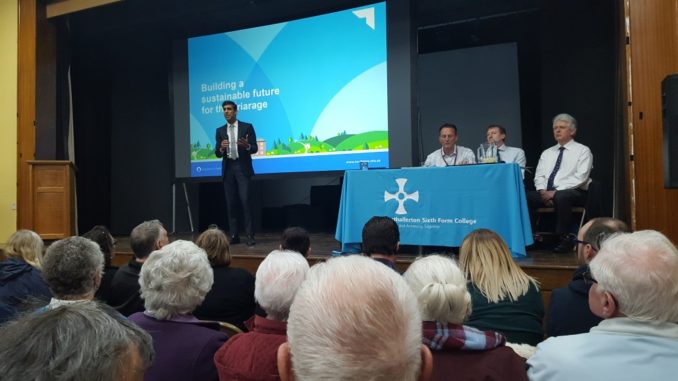
The Friarage Hospital’s medical director last night called on the public to back a new plan for the future of the Friarage as a packed meeting was told the there was no way of keeping the A&E open.
There was standing room only at the meeting at Northallerton School which was held last night to discuss the future of the hospital.
Dr Adrian Clements, the South Tees Hospitals NHS Foundation Trust’s deputy chief executive and Friarage medical director, told the meeting that the replacement of the hospital’s A&E with a critical care unit was a permanent move and had only been called “temporary” to meet NHS England rules.
Dr Clements and Dr James Dunbar, the Friarage clinical director, answered dozens of question from members of the public concerned about the future of the hospital.
The NHS chiefs faced criticism over the trust’s failure to recruit enough anaesthetists to keep the A&E open, with a member of the Save the Friarage Campaign saying they had “betrayed” the public.
Two audience members said workforce planning at the Friarage had been poor for a number of years, with one pointing out that there were no advertisements for anaesthetists on the trust website.
In response, they said the trust had gone to great lengths to hire more, but there was a national shortage and they had “exhausted their efforts”.
They added that the uncertainty over the future of the Friarage and the fact the hospital was very small, with anaesthetists wanting to work in larger hospitals, had hampered recruitment.
“People can criticise us for recruitment but you show them around a block that was built 60 years ago and that doesn’t help,” added Dr Clements.
The doctors said the decision had been taken to downgrade the A&E because it would have been unsafe to continue without enough anaesthetists
Both directors said, however, that they were optimistic about the future of the hospital.
They said the new system, descried by Dr Dunbar as “innovative”, would allowed the site to operate without anaesthetists, and would mean adults and children can still attend the urgent treatment centre with minor injuries and illnesses, such as broken bones, minor burns, cuts and grazes, coughs and colds, and vomiting and diarrhoea.
But they stressed that the system, which will be introduced from March 27, will mean those patients in need of critical care, such as severe chest pains, severe bleeding or uncontrollable bleeding, will not be able to receive treatment at the Friarage.
The audience was told that 90 to 95 per cent of patients who currently receive their treatment at the Friarage will continue to do so, with the aim to increase the number of patients receiving less complex, non-critical surgery at the Northallerton site.
Dr Clements said the new system had been designed by clinicians at the Friarage over the last 18 months, and had not been imposed on the hospital by the South Tees trust.
Several audience members, including Richmondshire District Council leader, raised concerns about the distances from the Upper Dales to James Cook, with one woman saying if she had a heart attack she’d be dead by the time an ambulance had got her to the Middlesbrough hospital.
Richmond MP Rishi Sunak, who chaired the meeting, also faced criticism, with one audience member accusing the MP of being there to “mark his own homework” because the problems faced by the Friarage were caused by his Government’s underfunding of the NHS.
In response, the MP said the Conservatives had maintained funding in health services at previous levels.
The meeting finished with Dr Clements urging the public to back the new operating model at the Friarage.


Be the first to comment